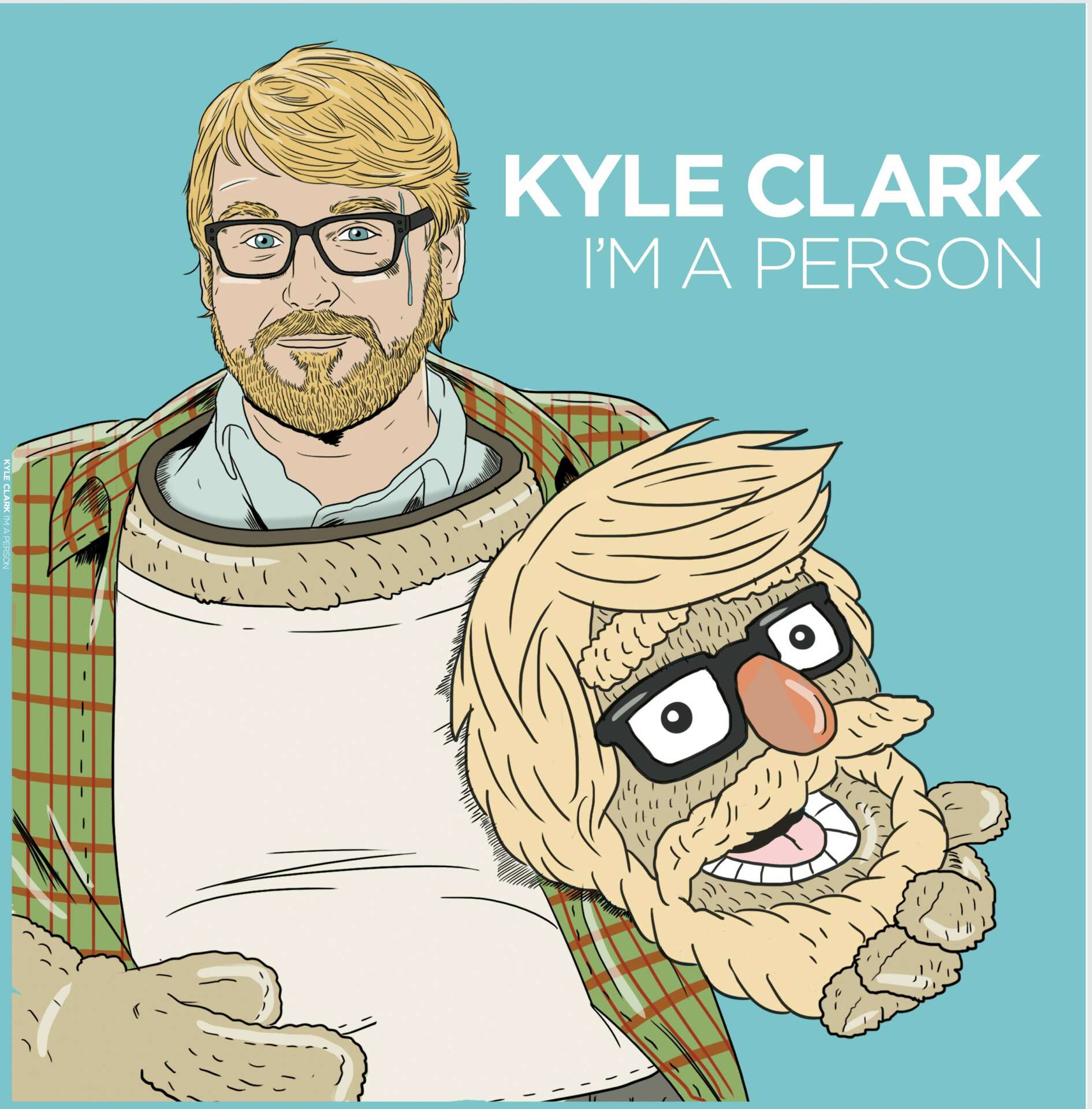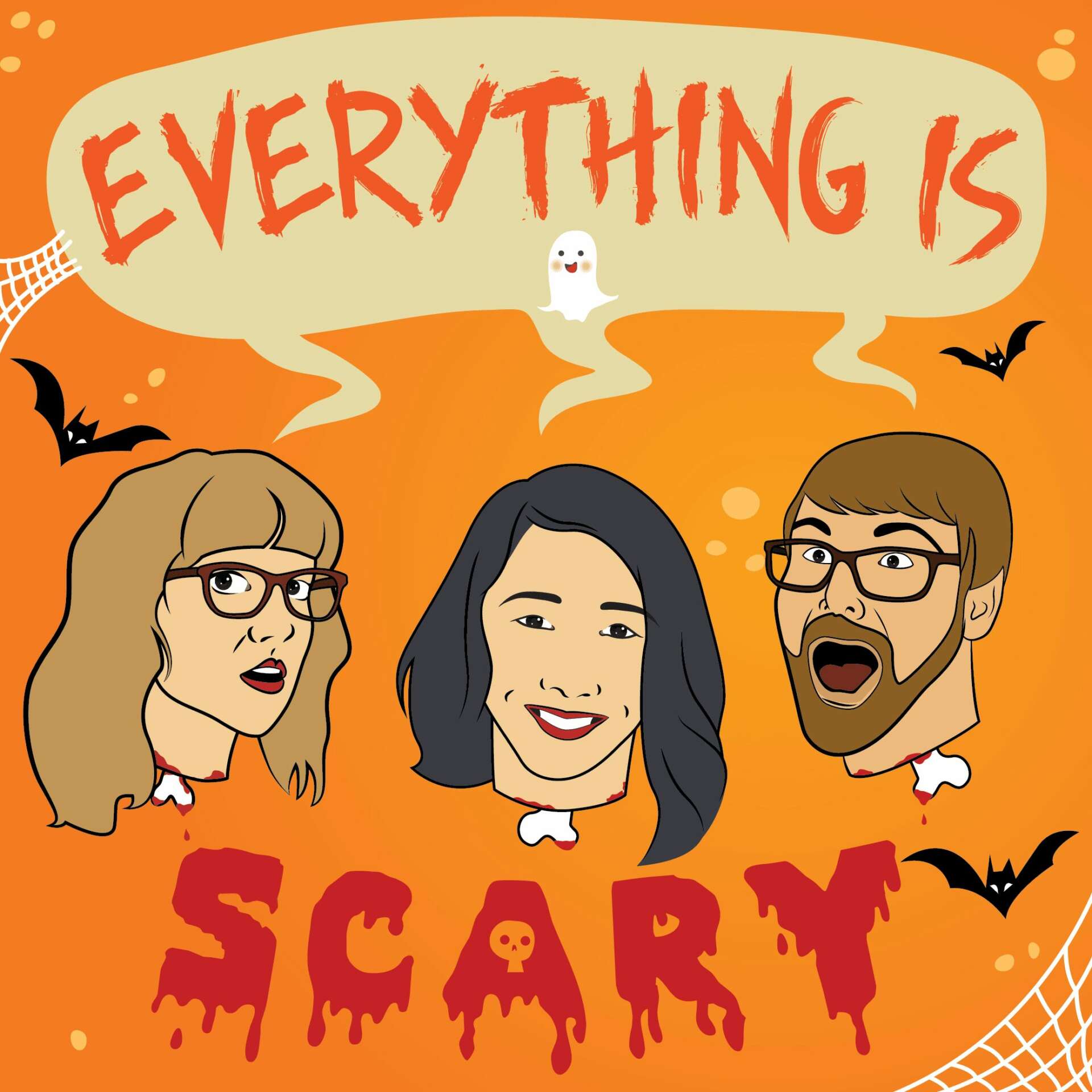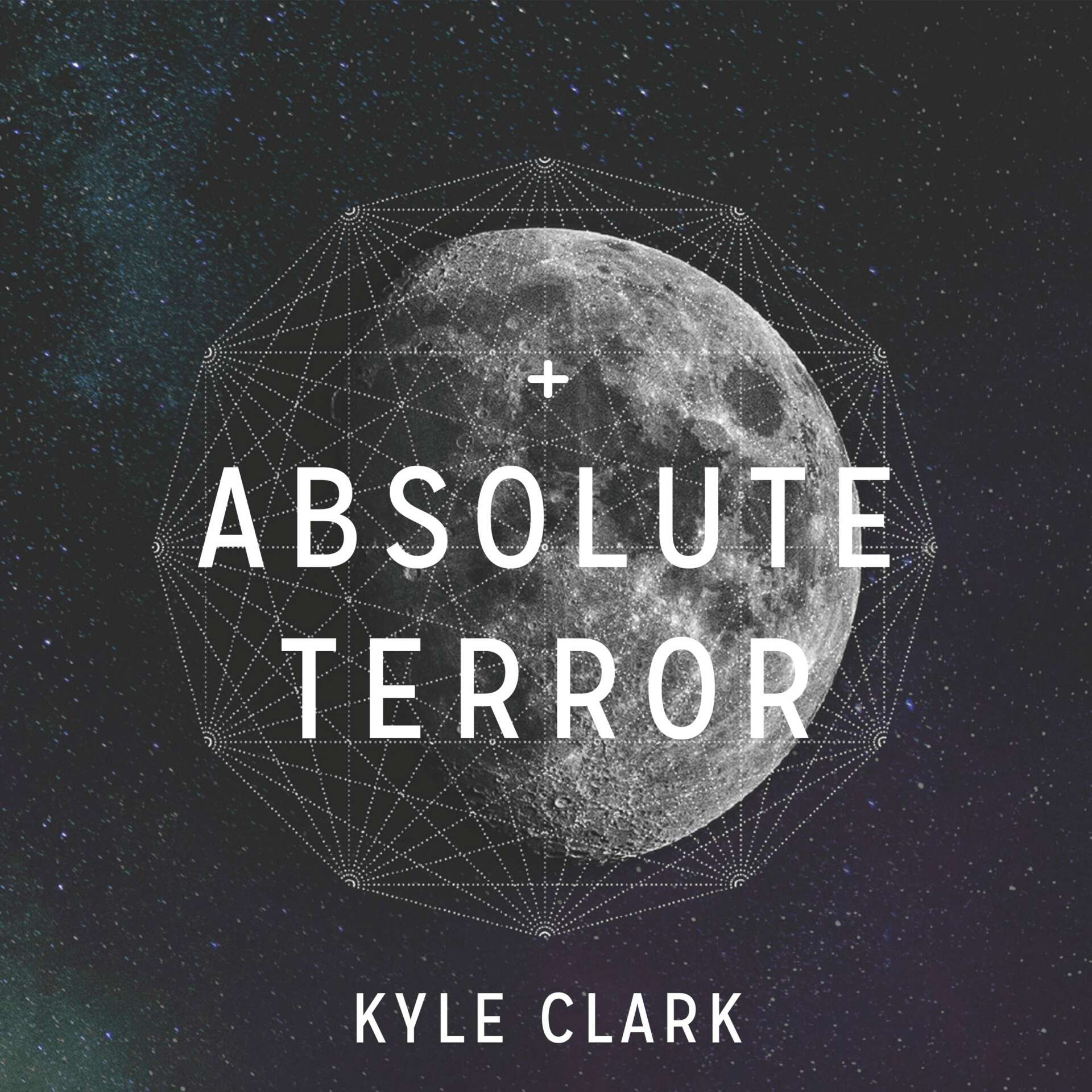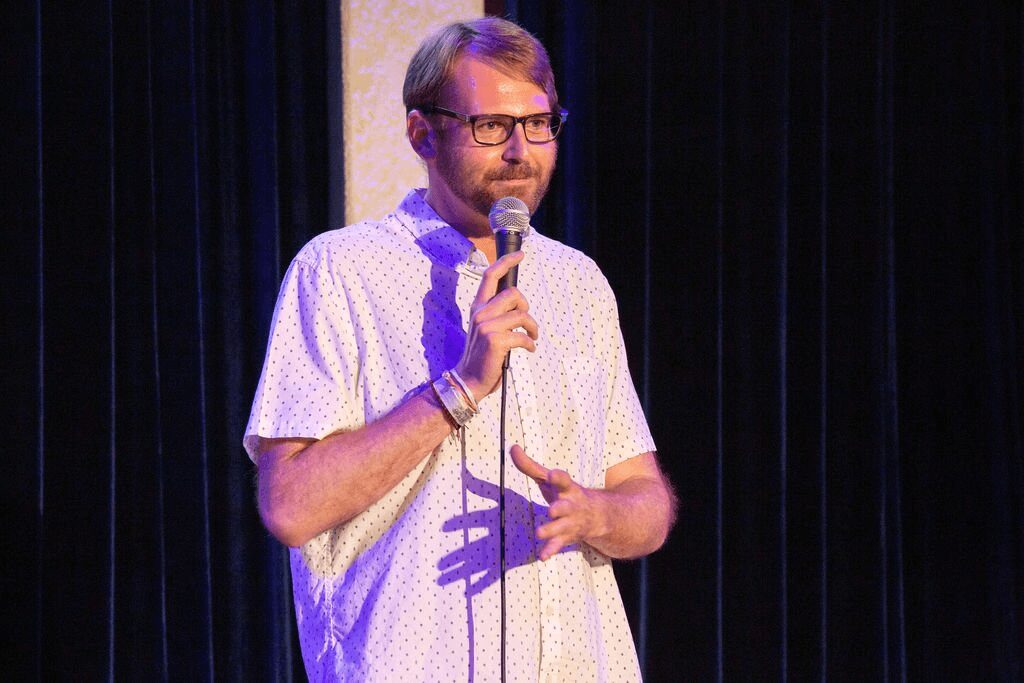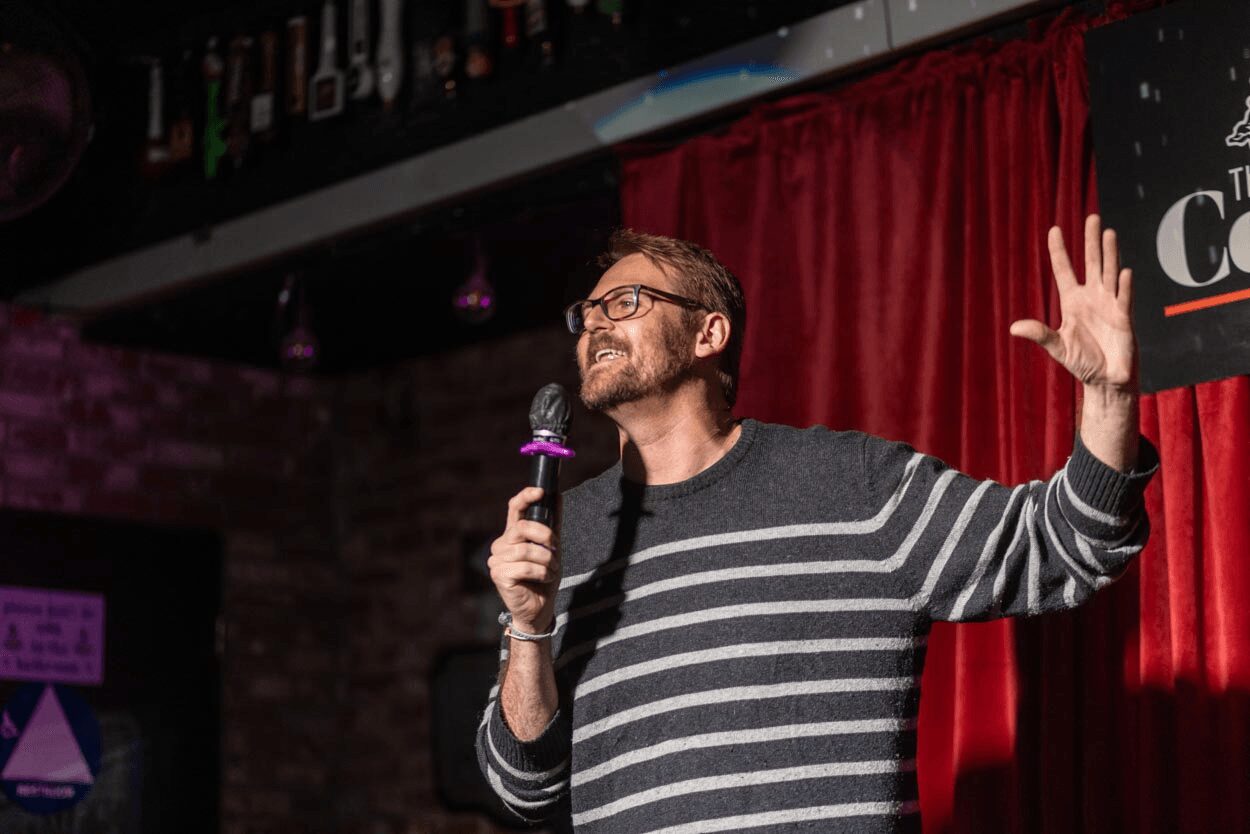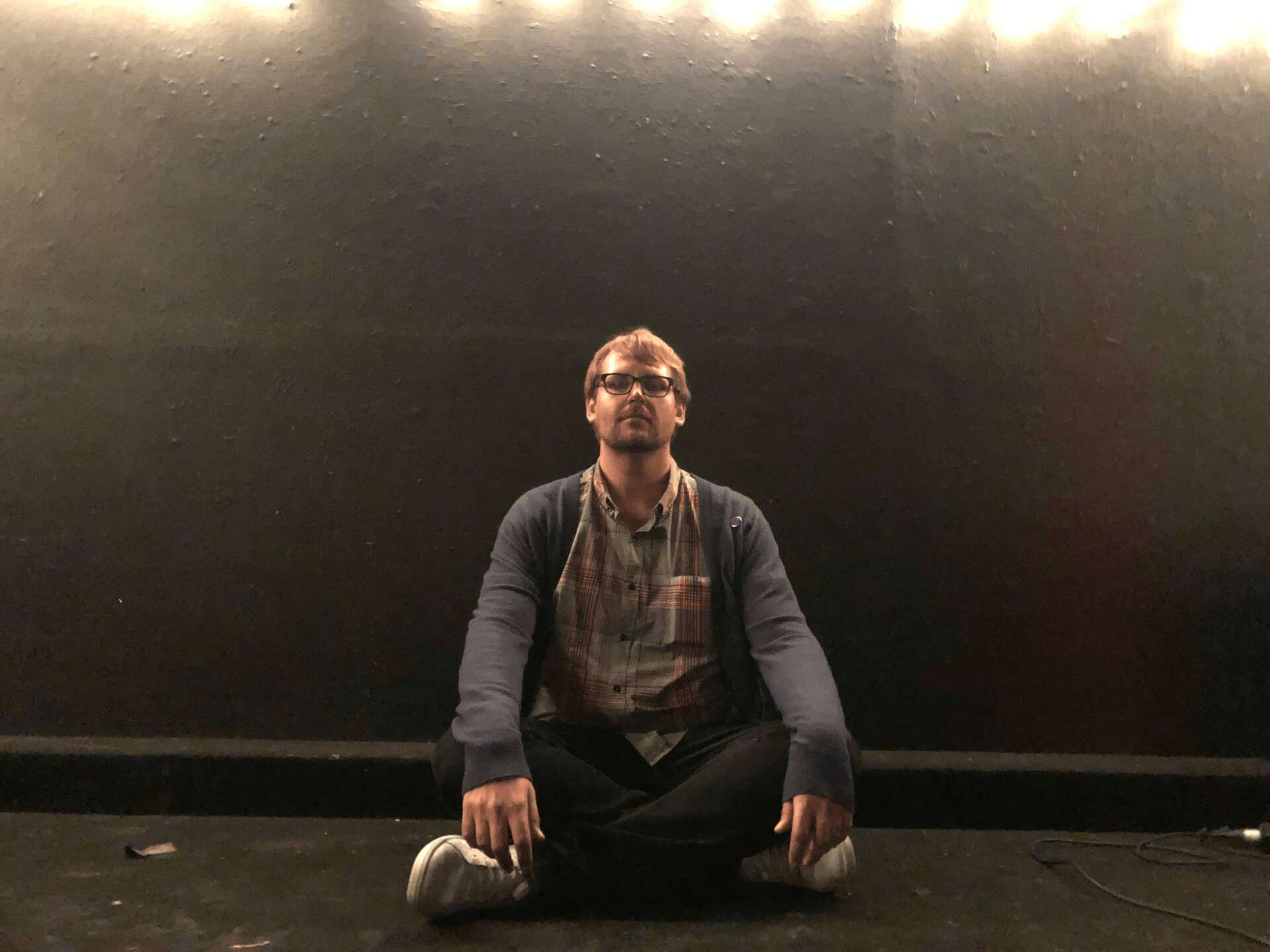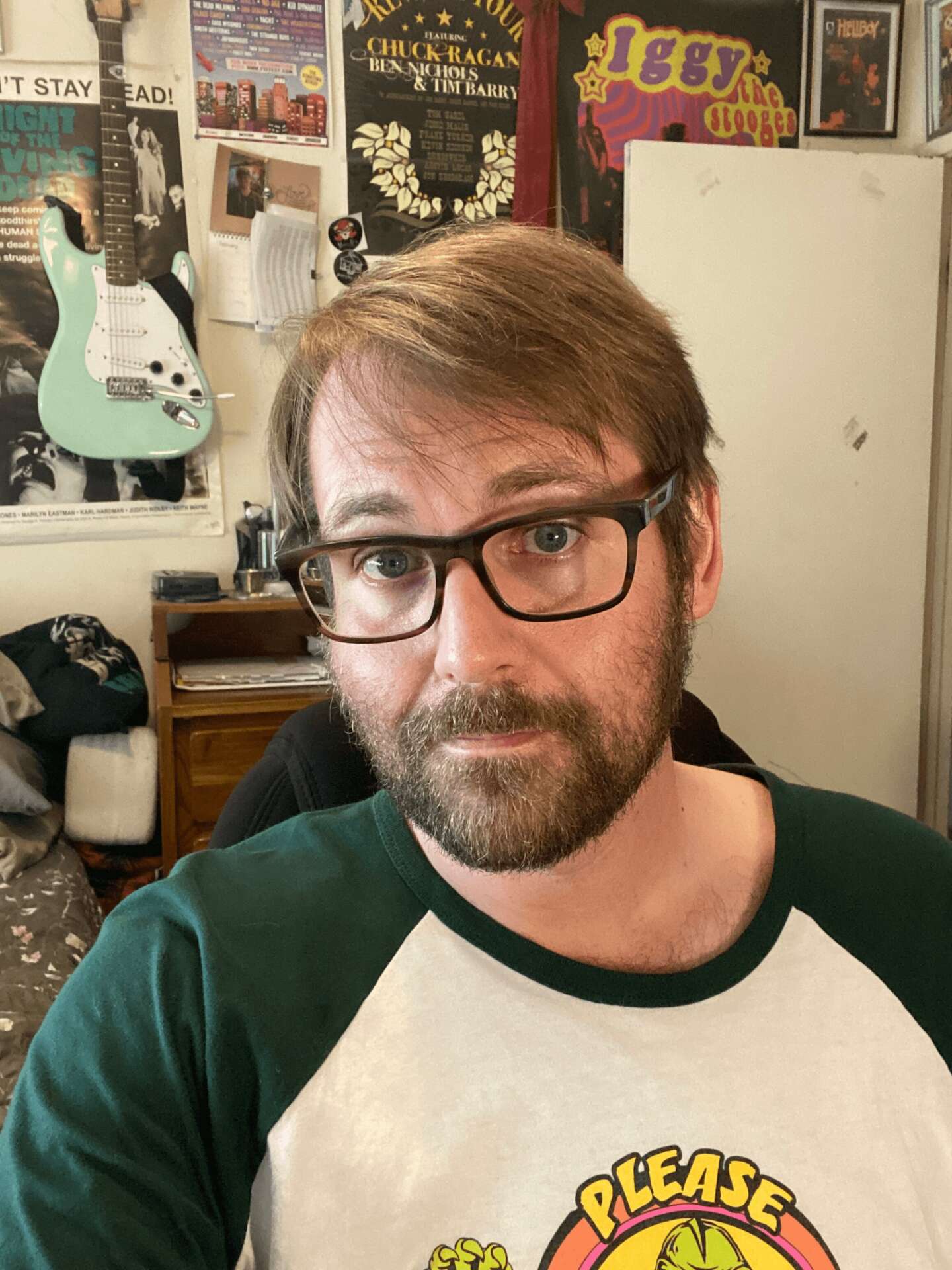We were lucky to catch up with Kyle Clark recently and have shared our conversation below.
Kyle, looking forward to hearing all of your stories today. We’d love to hear about a project that you’ve worked on that’s meant a lot to you.
I have recorded two podcasts in a boat on the open ocean. Not for any other reason that I needed to know if we could, and then a second time because it felt funny to do it again. As a podcaster and sound engineer, I enjoy recording in odd locations. I worked for several years on a podcast that regularly recorded on location. The recording rig was very smartly designed, and my proficiency with it gave me unique podcasting and live comedy skills. I was also working at a live venue that allowed me a space to continue to experiment with efficient, inexpensive, and low-noise recording options for recording on location.
This versatility in my recording has allowed me to create opportunities and situations for artists to diversify their environments and create unique or less expensive spaces to perform and create. My record label has also allowed me to actively support and encourage artists with a perspective worth amplifying. I have a platform and the ability to contribute to a creative community for which I have a great deal of love and respect.
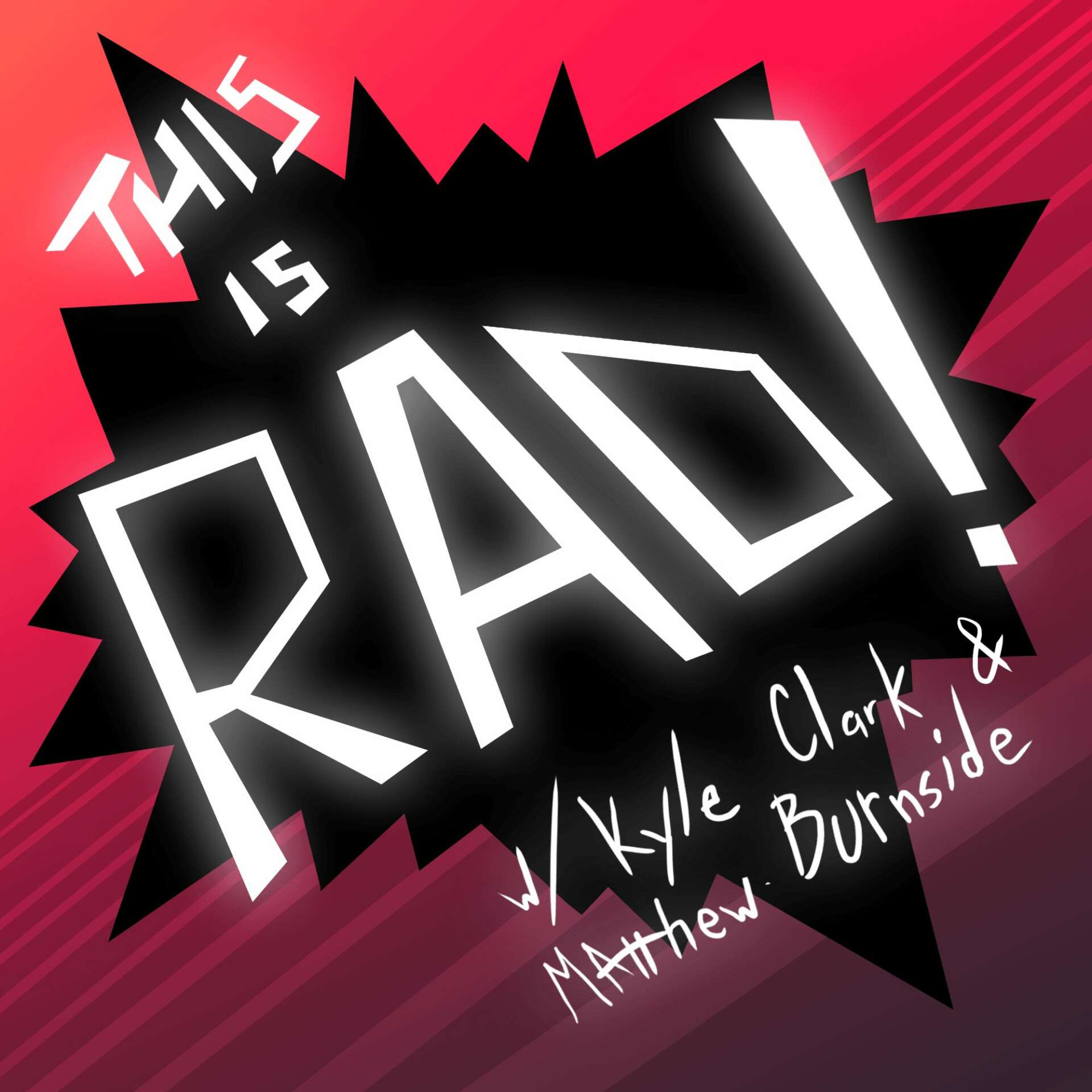
Kyle, love having you share your insights with us. Before we ask you more questions, maybe you can take a moment to introduce yourself to our readers who might have missed our earlier conversations?
I always need help figuring out where to start with introductions. Hello. My name is Kyle Clark, and I’ve been a stand-up comedian for 16 years. I’ve worked in podcasting for 13 years. I’ve run an independent comedy label for 6 years. I’ve produced over a dozen comedy albums and specials since 2020. I’ve directed numerous web series and comedy specials. I’ve written for television. Sometimes, I teach children’s theater. Oh, and now I’m trying to be a cartoonist.
This is not me trying to sound impressive. I feel very self-conscious listing it all out because it’s all just “makin’ stuff.”” I often joke that I don’t have a resume; I have a cry for help. I love to be busy when I love what I do.
I grew up feeling out of place. I’ve been tall my whole life, but I’m not super aggro or competitive. I have a joke in my act that, as a young boy, I learned early on the disappointed faces of coaches. But being an oddball gave me a lot of time to live in my head. Eventually, I realized you could write those stories in my head. Finding a creative outlet was intoxicating. I felt seen not for what I failed to live up to aesthetically but for how I saw myself. This outlet was handy as I entered my teen years. I was tall and heavy and a little effeminate. I felt alien but leaned into writing and creativity.
Then punk showed up.
It seems dorky now because I discovered punk in the lamest way. A kid I knew had brought in a copy of Spin Magazines’ 25 Years of Punk. Everybody in the magazine looked weird. But they were also cool. Then, I looked around at my peers. People were freaked out. This punk rock business was certainly NOT for them. That meant it WAS for me. I’d found a way to feel empowered by being different and expressing those feelings not through escapism but through something new.
At that point, it seemed prudent to get a guitar and start a band as quickly as possible. My teens and early 20s were spent playing music, going to shows, and learning the basics of audio recording. My dad and brother are also musicians; the larger audio world fascinates me. I like gadgets and gear. The idea of learning the tools to make stuff meant fewer barriers between me and what I want to accomplish. I love learning. I have a master’s degree in education, and I think educational psychology is an under-discussed element of creativity. Growing as an artist inherently means you are learning. I learned how to record music both live and in the studio. This will come in handy later.
Near the end of college, I’d taken a class on comedy writing, and the final involved everyone in the class performing a 5-minute comedy routine at the famous Ice House Comedy Club in Pasadena, CA. I still thought of myself as a musician first and foremost. However, I’d never stopped writing and primarily worked in comedy. Growing up feeling out of place, a sense of humor was one of my primary tools for trying to be liked. I was also obsessed with The Simpsons, so I had an excellent teacher. I did well. I was asked to come back and perform in a comedy competition. I won several rounds before losing in the finals to a professional comedian. I look back and cringe at my aloofness at the time, but the whole thing seemed like a fun college experiment. I was a musician, after all. And I was gonna be a musician forever…
I graduated college at the height of the recession. I’d had two music projects flame out in rapid succession. I needed a change of pace. I tried shooting some short films but lacked the money and resources to make anything besides some fun short films with my friends. I also worked a pair of jobs that constituted a full-time job. By day, I was an after-school aid for a group of middle school students at a private school. On nights and weekends, I worked at a high-end liquor store. I’d eventually be hired on as the school’s theater teacher and go back to school for my credentials. I needed a new creative outlet and remembered my brief dabble in comedy.
I decided to give it an honest try at stand-up comedy. The only problem was that I needed to figure out what I was doing. I was naively confident. I know how to tell jokes, I thought. I know how to perform on stage, I thought. But stand-up comedy found a way to play to all of my insecurities. Luckily I got to suck in private for a while. I didn’t know a single other comedian. I’d only been to a comedy club during the few times I’d performed at the Ice House early on. But I knew about open mics. As a young musician, I’d done open mics and went to some of my old haunts. They enjoyed the novelty of a comedian breaking up the musical acts. I didn’t meet another comedian in the wild for two years. As a result, when I finally entered the Los Angeles comedy scene, I felt like I was showing up at a public high school after a life of being homeschooled.
I was commuting a lot at the time. I have always been an avid audiobook fan. Still, I quickly depleted my local library’s books on tape department. A friend recommended that I try listening to podcasts. Enticed by the idea of free long-form audio content, I investigated the world of podcasting. This would prove to be a pivotal moment in my life. The 2010s saw a second stand-up comedy boom in America, primarily fueled by the rise of comedian-hosted podcasts. I was familiar with Marc Maron’s comedy after seeing him open for Henry Rollins at a spoken word show in college. Since he was one of a dozen comedians I could name, I started listening to his podcast WTF. The show became a crash course in stand-up comedy’s history, philosophy, and mechanics. It felt like a gift to be a hungry young comedian who suddenly had a seemingly endless source of insight from the pros. Roughly one billion comedian podcasts followed, one of which was started by a TV personality undergoing a brand refresh. The Nerdist Podcast began in 2010. Its mixture of popular stand-up comedy insights and niche celebrity interviews proved to be a winning formula. The Nerdist expanded quickly from a podcast into a fully tilt media company. In the summer of 2011, they took over a performance space in the back of Meltdown Comics, a hip Hollywood comic shop. I was hired the first summer as part of their intern program, but my experience doing live sound got me a gig working as a tech for shows. I also took over the open mic. I worked hard to keep the mic a welcome space for all walks of comedy. Running that mic is still one of my happiest memories. For seven years, the theater was a significant hub for LA comedy. I recorded my “I’m a Person” album at Meltdown in December 2015.
During my time at Meltdown, something strange happened. First, google had begun investing in new media companies, like The Nerdist, to create premium content for YouTube. I’d successfully pitched a web series to Nerdist that ran for two seasons. Suddenly, I found myself directing a pilot for a show that would be on a channel. Instead of directing children, I was now directing popular alternative comedians. Then, I was contacted by The Nerdist Podcast via a DM on Twitter. I was offered jobs on both the flagship Nerdist Podcast and an additional assistant job on AMC’s new after-show Talking Dead. For the next six years, The Nerdist Podcast, Talking Dead, and the theater at Meltdown, along with stand-up comedy, would be my life. It was a lot of fun.
In 2016, I left The Nerdist podcast for my first writing job. I worked for two seasons on Hidden America with Jonah Ray for the ill-fated SeeSo streaming service. I still think that show is one of the best things I’ve ever written for. It was a sketch show disguised as a travel show in the grand tradition of BBC comedies like Steve Coogan’s Alan Partridge. I also worked for Shudder and Comedy Central shows before being offered a full-time writing job for Talking Dead.
My eight years at Talking Dead, first as a production assistant and then as a writer/producer, was an incredible education in television production. Getting to be that close to a pop culture phenomenon was sometimes surreal. With my comedy background, I was also a warm-up comic for the show. Sometimes The Walking Dead is cripplingly depression, and it helped to have somebody come to cheer up the crowd a bit before tapings. It was fun, and I ended up with a whole Walking Dead specific stand-up set.
All this time, I was continuing with my stand-up. In 2018, I’d made plans to record my next album, “Absolute Terror,” at The Star Bar in Atlanta, Georgia. I’d self-produced and released my first album and was preparing to do the same with my second album. My background in music and podcasting gave me a strangely robust skill set for producing and recording live comedy shows. I’d put together a system that operated entirely outside the venue’s sound system and could be set up quickly in any space. I love live music albums. I love weird venues for shows. Plus, I was starting to develop opinions on ways to streamline the process of making comedy albums.
I’d been talking to two comedian friends who’d both expressed some interest in making albums as I’d been working on mine. I mentioned to both that they should do it. It was a great learning experience and made me a better comic. They both said the same thing: “Would you help me?” Suddenly, I was no longer just recording and releasing my own stuff as a way to get seen. Suddenly, I was helping others work through the process I’d gone through. Not just the technical side but also being able to be a sounding board for people as they put their albums together. The teacher in me can’t help but want to support people. That’s a dangerous mindset in entertainment sometimes. But I’d seen a lot of great comedians quit over the years. Quitting stand-up is remarkably easy. You stop showing up. There are so many good reasons to leave; for families, jobs, and or just sheer frustration. But comedians are sick. They can’t stay away. I’ve quit and retired a half dozen times over the years. What always made me sad was losing those people’s jokes. Great jokes by funny people who didn’t have the right look, vibe, or subject matter for an industry that can be remarkably shallow sometimes.
So, I started a record label. Three were releases to begin with. My own, along with my friends. Radland Records is my small way of putting my money and time where my mouth is. Growing up on punk rock, the dream of a band wasn’t to sign it big and live like rock stars. It was to make a living with your art and connect with people who dig what you do. But comedy is all about waiting to win the lottery. I will never win the comedy lottery, but that’s okay. I don’t need to be Joe Rogan or Patton Oswald.
I’m gonna do comedy for the rest of my life because I don’t know what I’d do with my life without it. But I needed to re-contextualize it. It’s easy to get frustrated. Comedy loves chasing trends and wringing them out until there’s nothing left. You can look back at the last 10 years and see it. I’m not saying there’s anything wrong with that. Anyone trying to make things is working hard. I want to tell people that they’re good enough. That they’re talented. I see many people I respect and selfishly want to save their material for posterity. I can document the jokes of comedians that might otherwise be lost. Also, it’s fun.
I love comedy. I love comedians. They’re insane. I’m insane. We’re all insane because we’re trying to make a living at being charming professionally. I love talking to comics about their act. As a surprise to no one, a teacher with an English degree likes to deconstruct and analyze creative work. I enjoy the process of supporting artists. It’s similar to what I get from my podcast “This Is Rad!”. I like talking to people. I enjoy getting to know people. People are fascinating. It’s why I like creative stuff. It’s people communicating in exciting ways. That’s always been my impetus, and the older I get, the more substantial the sentiment remains; I make stuff to connect with others. Growing up, I felt so weird and clung to anything that made me feel like I made sense in the world. If I can say something to make somebody else feel less weird, I’ve succeeded as an artist. Radland Records helps me amply that with more unique voices. We, fellow weirdos, are out here. Come find us.
I do an 80-20 split with my artists. They take 80, and I take 20. I stole this model from Image Comics. Everybody has been happy with the arrangement, and I pay folks out quarterly. It feels insane that the label now has over a dozen releases and has been around since 2018. It still feels new and like we’re getting off the ground.
Then 2020 happened. I lost my job at Talking Dead and suddenly became entirely out of entertainment. I lived frugally during my time at Talking Dead, I was mostly working or traveling for stand-up. I lived at home because I was home so little, and it felt insane to pay LA rent prices. Then suddenly, I was just a guy living at home with no job. Once again, sound would save me. I still worked for The Jackie and Laurie Show, a comedy podcast featuring Jackie Kashian and Laurie Kilmartin. That income helped offset my savings. But I needed more work.
So, I entered the Wild West world of Freelancing. When comedy shows began again in earnest, I set out to produce a series of records I’d set up with artists during quarantine. My work was getting noticed, and I began getting offers to produce artists outside my label. It was validating that people I respect want to work with me. I like to keep production simple. Sometimes, I worry my clients will be disappointed that I don’t bring more razzle dazzle grandiosity. Most of my favorite music albums are consciously lo-fi. The texture is part of the sound and the experience of the listener. Even classic hifi albums I love, like The Downward Spiral or Music from Big Pink, were recorded in spaces where they were trying to capture a specific energy. Most of my comedy career was not spent in traditional comedy clubs. Some of the best comedy shows I’ve seen were in dive bars and created spaces. I want to capture the energy of those shows with those crowds in those spaces.
As I produced more albums, I got more confident and ambitious. Not to make more expensive specials, but to get weirder. Jackie Kashian approached me with a strange idea. Film a comedy set using the backup camera on a car. It was a statement about the lack of opportunities afforded female comedians over 40. Also, Jackie has a shocking number of car jokes. “Looking Back: A Mini Comedy Special” is 11 minutes of weirdness, of which I am incredibly proud. I also produced “Haunt Season,” a mini special where I tell jokes while walking through a Halloween haunted house attraction.
The comedy special is a relatively limited way of presenting comedy. When MTV started, most videos were footage of the band performing live. You are presenting the band playing a simulated version of their live show to entice you to see them when they come to your town. That’s the same transaction that a comedy special provides. But, music videos abstracted beyond simply being a band on stage. I don’t understand why there isn’t more of that in comedy. I understand sketch comedy exists. But short-form stand-up with a twist is just fun. Like music videos, they give you a look and feel for an artist beyond just their music. A generation of music fans undoubtedly looked at artists who gained prominence through music videos as not real artists. Previous generations love to devalue the next generations’ way of doing things. But that’s how things evolve. Plus, without music videos, we don’t have Devo. And a world without Devo is not a world I want to live in.
All my creative outlets were suddenly on indefinite hiatus when the world went into lockdown. I needed something I could latch onto as the world spiraled. I’d always wanted to learn to draw. With a lot of time and not a lot to do, I bought instructional art books and took myself to art school for the next two years. Throughout learning to draw, I started experimenting with cartooning. I’ve been a fan of comic books and comic strips since I was a kid. Drawing and painting had become an incredibly cathartic way to stay mindful. I now can’t imagine my life without it. I’m working on a long-term comic project I hope to complete by the end of 2025. It’ll be interesting selling it when I’m back out doing stand-up. A comic making comics. Or at least trying to!
Freelancing has kept me alive, but I needed something steady to grow. Plus, I wanted to do something outside of entertainment. I needed a foot in the human world. I missed my days as a theater teacher. I applied to a few schools and summer camps and found a great program. I still do everything else, too. I’m busy all the time, but I love it.
I want to keep experimenting with the concept of the mini-special. It’s just fun. I’m gearing up for another round of album recordings with a talented group of comedians. A mix of releases for Radland Records and Freelance gigs. I directed my first full-length comedy special at the end of last year, which should be out later this year. I worked with my longtime friend Anna Valenzuela, and the concept she pitched was brilliant. Collaborating with her on “Murderpuss” has been a pleasure, and I’m excited for people to see the final product. I still produce The Jackie and Laurie show for Maximum Fun dot org and host my podcast This Is Rad!, an interview show centered around people’s unique interests. Everything is Scary, a horror film review show with Amy Drolet. Plus, at some point, I get to figure out how to sell comic books and get into comic conventions. Maybe they may need a comedian or a sound guy…
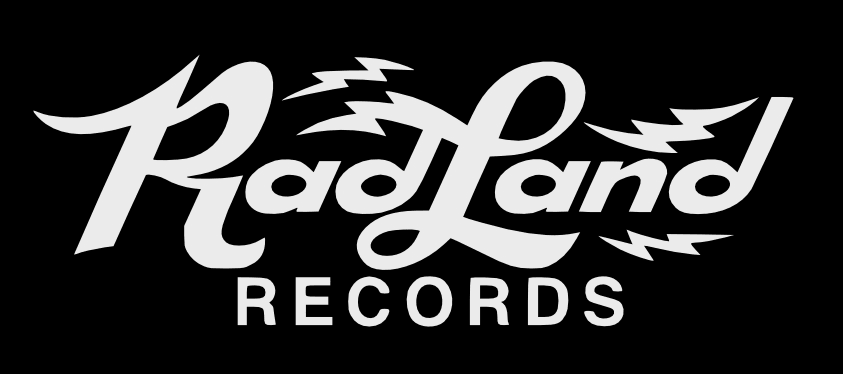
What’s the most rewarding aspect of being a creative in your experience?
Short answer:
Collaboration and connection
Longer answer:
I’ve observed a phenomenon over the five years since I started producing comedy albums at some point. Usually, I will get a late phone call in the home stretch coming up to the recording. It’s the comic, usually out at a show, and they are panicked. They are riddled with self-doubt and imposter syndrome and have no idea why they agreed to this crazy project. Then I get to tell them that everyone I’ve ever known who has made a comedy album has had this moment right before the end. So the good news is, everything they’re feeling is normal. Then, I reminded them of every reason I wanted to work with them. Those are some of my favorite conversations. It’s everything I needed to hear while doing my first record. I can be that for somebody else in that position; it feels good.
My immediate answer comes from the perspective of being a producer. It’s because it’s the most recent of the creative outlets. But for podcasting and comedy, the answer is basically the same.
I love connection. Laughter is a reaction that is based on recognition. Everyone laughing is sharing a moment, and there is something extraordinary about that. My act as a comedian is trying to seek connection with strangers through our collective idiosyncrasies. I feel like a space alien walking around most of the time. There is comfort when I find out other people think the same way. And that works both ways. I learned long ago that no one wants to hear me complain on stage. But that doesn’t mean I can’t be emotionally honest; I must work harder to express it. In the long run, it has made me a better comedian. Podcasting splits the difference between performing and producing. I’m engaged in a two-way conversation but still proactively performing on some level.
I’m a social creature who engages in many solo creative ventures, so I value any opportunity for community.
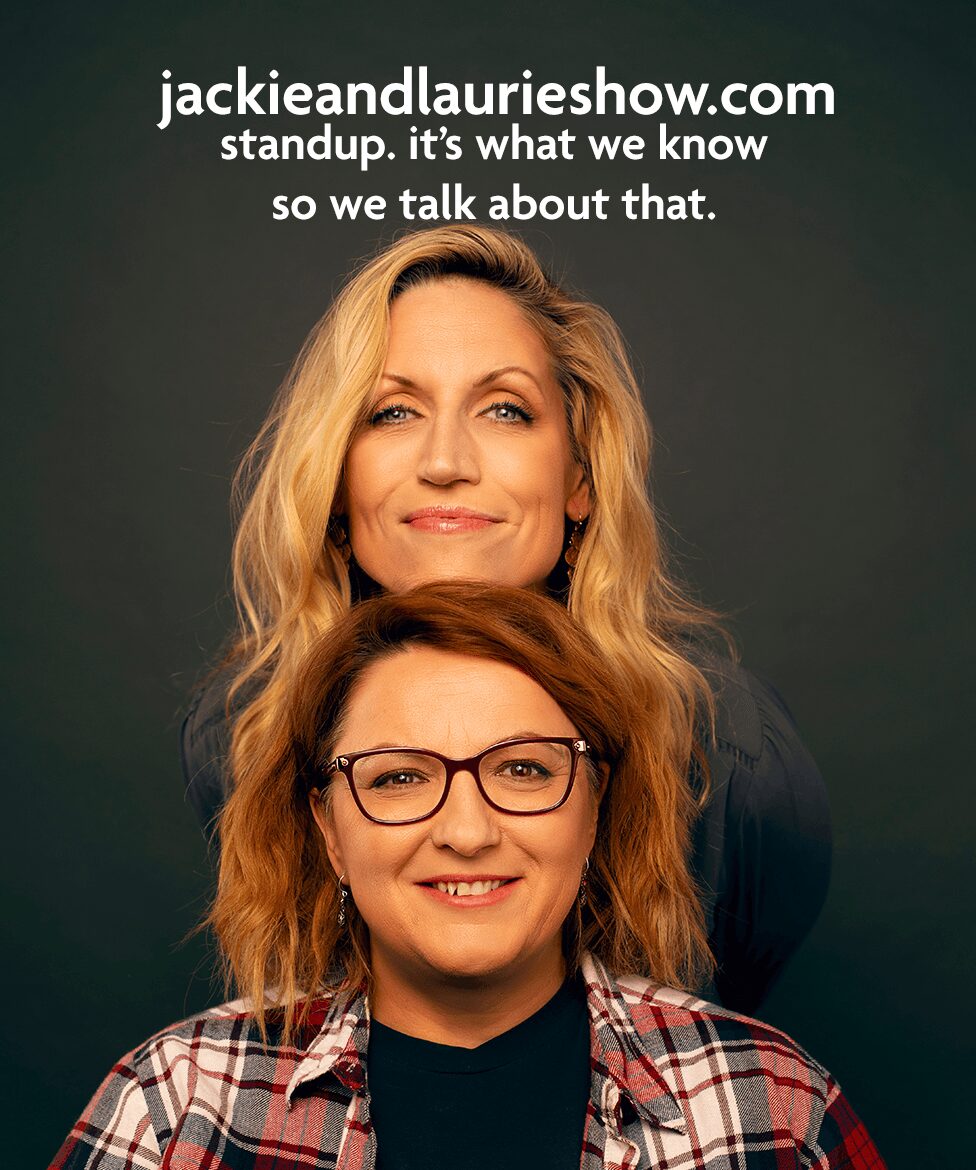
Are there any books, videos, essays or other resources that have significantly impacted your management and entrepreneurial thinking and philosophy?
Our Band Could Be Your Life by Michael Azerrad
Michael Azerrad’s book “Our Band Could Be Your Life” chronicles the stories of 13 bands that helped create the American DIY touring circuit. This is the one if you want a book that will ruin an impressionable 17-year-old who doesn’t know what to do with his life. Every story is part of the history of the American underground music scene of the 1980s that would lead to the rise of Nirvana and the grunge movement. The book is super inspiring. It’s kinda like “on the road” but with less sex and more vegans. You get everything from the iconoclast philosophies of Fugazi to the drug-fueled mayhem of The Butthole Surfers. I still have the copy I bought at Boarders in 2004. I still break it out and read chunks periodically, like it’s the bible. If you’re curious about punk rock and wonder if you may have punk rock inside of you, this book will help you unlock your true potential.
Contact Info:
- Instagram: https://www.instagram.com/kyleclarkisrad/
- Other: Radland Records
https://www.radland-records.comJackie Kashian – Looking Back (mini special)
Kyle Clark – Haunt Season (mini special)
Absolute Terror (comedy album, 2018)
I’m a Person (comedy album, 2016)
